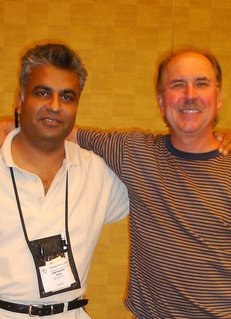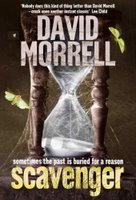 Information about this production is closely guarded; however, I can report a little bit about the plot. It seems that Vietnam War veteran John James Rambo has been living with his family in relative peace for the past 15 years, but remains in the employ of the U.S. military. Work pressures finally force him to move his family to the American outback. There, the former Green Beret and his family are attacked by white supremacists, and Rambo has to risk life and limb to rescue his 10-year-old daughter, who is being held hostage.
Information about this production is closely guarded; however, I can report a little bit about the plot. It seems that Vietnam War veteran John James Rambo has been living with his family in relative peace for the past 15 years, but remains in the employ of the U.S. military. Work pressures finally force him to move his family to the American outback. There, the former Green Beret and his family are attacked by white supremacists, and Rambo has to risk life and limb to rescue his 10-year-old daughter, who is being held hostage.Rambo 4 has had a carousel of writers and directors associated with it, but it appears that Sylvester Stallone may well be directing the movie (as well as starring in it). And for those of you who are unaware of the link between Rambo and author Morrell ... well, click here. Earlier this year, UK publisher Headline released, as part of its classics series, a special anniversary edition of First Blood (1972), the debut novel by Canadian-born literature professor Morrell, in which John Rambo was first introduced.
I was also pleased this week to receive, from Headline, the cover art for Scavenger, Morrell’s follow-up to his claustrophobic real-time thriller, Creepers (2005). Scavenger is due to be released in March 2007, and it’s one of the books I am most anticipating reading in the near future, as I happily shortlisted Creepers among January Magazine’s favorite books of 2005. It’s also a novel in which I appeared--quite without my volunteering. As The Rap Sheet noted earlier this week, novelists have the tendency to incorporate real living people into their stories. This happened to me in Creepers, where a certain Ali Karim has a problem with his credit card while checking into the Paragon Hotel. Morrell penned an interesting article about the work he did on Creepers, so while you’re waiting for Scavenger to appear on bookstore shelves, why not point your browser here. Morrell is tight-lipped about his forthcoming book and will only say that Scavenger is “a desperate high-tech scavenger hunt for a hundred-year-old time capsule.”
I’ve spent many years in the company of books by David Morrell (with whom I am shown above). During my late teenage years I read his horror fiction and was traumatised by his novel The Totem as well as Testament. Later, I tore through his espionage thrillers, finishing most of them within in a day or two, and as I grew older, I read his mature work and marveled at his way of weaving action into a thought-provoking plot. With their duplicitous characters and enemies legion and murderous, his books, for me, retained a sense of purpose and perspective. No matter how grim the circumstances, there is always purpose in the world of David Morrell.
A few years ago, during Bouchercon 2003 in Las Vegas, I had the chance to interview this author at length. He talked modestly about his work, and I found out that he’d survived a troubled and traumatic childhood (which he detailed in the introduction to his second collection of short stories, Nightscape). Later, he and his wife, Donna, faced a personal tragedy with dignity and grace, which is outlined in his book Fireflies: A Father’s Tale of Love and Loss. In fact, much of Morrell’s work has a melancholic edge. As he told me:
“To paraphrase Graham Greene, ‘an unhappy childhood is a gold mine for a novelist.’ My father was an RAF bombardier who was shot down over France during WWII. He had met my mother when he was sent to Canada to train airmen there. When I was very young, no one bothered to explain why I didn’t have a father. I couldn’t understand why my friends had men in their homes, while I did not. Then my mother, unable to hold a job and take care of me simultaneously, put me in an orphanage. Later, she put me on a Mennonite farm. Eventually she remarried, but my stepfather didn’t like children or staying at home. There were countless arguments that left me terrified about my safety. I used to put a pillow under my covers to make it look as if I was in bed. Then I crawled UNDER the bed and slept there. My major themes come from that time: sons searching for fathers; fear; the need for control of one’s emotions; the perception that the world is a hostile environment. We lived in small apartments over bars, where the drunks fought in the alleys. On one occasion, there were shots. Not a pleasant time.”With a complex body of work that spans more than 30 years and traverses the Horror, Espionage, and Thriller genres, Morrell is something of a giant in the literary world. His books have picked up a number of awards, including the 2003 Thriller Award, presented to The Protector during
 the Love Is Murder Conference in Chicago. In 2005, he won the Bram Stoker Award in a tie with Charlee Jacob (Dread in the Beast). His efforts, in cooperation with Gayle Lynds, Lee Child, M.J. Rose, and others, to establish the International Thriller Writers (ITW) were all-important. Like fellow scribe Stephen King, Morrell helped others in the field by publishing his take on the writing process, Lessons from a Lifetime of Writing, which, together with King’s On Writing, may be one of the two most significant books about that creative enterprise. (Morrell also penned an interesting essay for Crimespree Magazine about grappling with what constitutes a “thriller.” Download that essay as a PDF here).
the Love Is Murder Conference in Chicago. In 2005, he won the Bram Stoker Award in a tie with Charlee Jacob (Dread in the Beast). His efforts, in cooperation with Gayle Lynds, Lee Child, M.J. Rose, and others, to establish the International Thriller Writers (ITW) were all-important. Like fellow scribe Stephen King, Morrell helped others in the field by publishing his take on the writing process, Lessons from a Lifetime of Writing, which, together with King’s On Writing, may be one of the two most significant books about that creative enterprise. (Morrell also penned an interesting essay for Crimespree Magazine about grappling with what constitutes a “thriller.” Download that essay as a PDF here).On the subject of David Morrell’s novels, Michael Connelly once said: “If you’re reading Morrell, you’re sitting on the edge of your seat.” With the author now claiming more than 22 million copies of his books in print, it means there sure are a lot of people sitting uncomfortably around the globe.

















3 comments:
David Morrell has also written a marvelous book on the craft of creating fiction, LESSONS FROM A LIFETIME OF WRITING, and he occasionally teaches a half-day seminar using LESSONS as a text book. If you're serious about writing, I highly recommend both.
Oops. Guess I should have read the post a little more thoroughly before mentioning LESSONS.
What a marvelous commentary on David Morrell! One thing you didn't mention, however, is David's enormous generosity with younger writers...for many long years, he's taken the time out of his busy schedule to mentor writers: reading manuscripts, recommending writers to agents and/or publishers, giving blurbs and other endorsements...that's in addition to his "hallway mentoring" at every conference he attends, when he takes the time to answer each and every question thrown at him from aspiring and upcoming writers.
And if you're fortunate enough to call David Morrell a friend, you'll know then his enormous generosity and fanatical loyalty to those he calls friend. Besides being a huge luminary as a writer, David is one of the most impressive human beings it's been my pleasure to know in 50 years of life; his kindness, humanity, creativity, generosity and huge spirit would stand him out in any endeavor. We thriller writers are fortunate to have him.
And I'm proud to call him my friend.
cheers, Marcus Wynne
Post a Comment